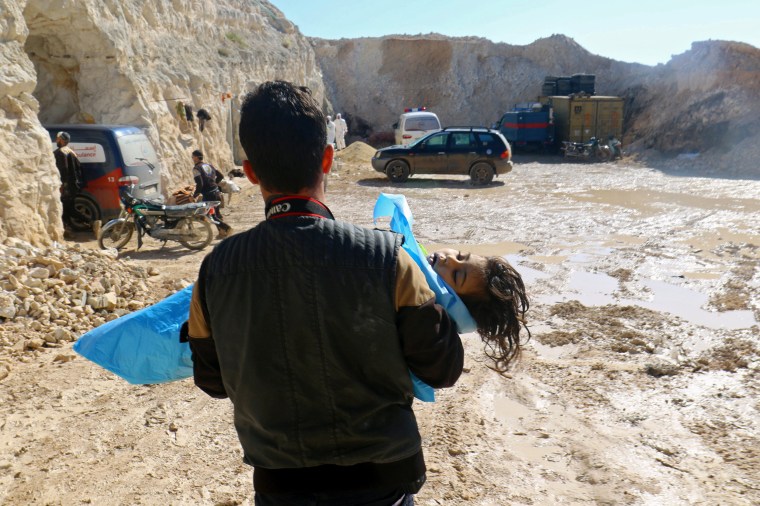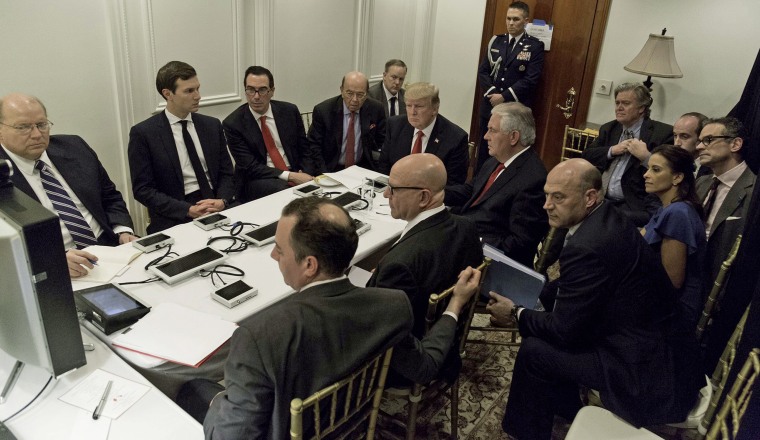The decision that led to a missile strike in Syria was made over 72 hours and several meetings between President Donald Trump, top White House advisers and his national security team.
White House Press Secretary Sean Spicer called it a "very deliberative process" of asking questions and mulling courses of action. It involved a complex and fast moving series of discussions which began Tuesday during the president’s 10:30 a.m. daily intelligence briefing.
Tuesday
Tuesday was slated to be one of heady preparation for the week's series of state visits from international leaders. The administration pivoted from the tête-à-tête with Egyptian Preisdent Abdel Fattah el-Sisi's just a day before and looked forward to receiving another regional leader, King Abdullah II of Jordan, on Wednesday.
But early Tuesday morning, horrific accounts began pouring out of Syria of chemical bombs being dropped on Khan Sheikhoun, a town in Syria's northern region. Activists say at least 100 people — including 25 children — died and 400 were injured in a predawn attack considered one of the deadliest of the six year conflict.

Trump saw the "very, very disturbing" and "moving" images of Syrians gassed that played out on television screens, Spicer said.
"He was very moved and found the event extremely tragic," Spicer said.
RELATED: Trump: Why I Launched a Missile Strike on Syria
Rebel groups and aid organizations immediately condemned the deaths near Idlib calling them a “chemical weapons attack” and identified Syria’s President Bashar Assad as the culprit. Lawmakers such as Sen. John McCain, R-Arizona, a longtime critic of the Assad regime, quickly issued similar condemnations.
Roughly two hours after the president was briefed on the Syrian attacks, Spicer read aloud a statement to the press later attributed to President Trump.
“Today’s chemical attack in Syria against innocent people, including women and children, is reprehensible and cannot be ignored by the civilized world. These heinous actions by the Bashar al-Assad regime are a consequence of the past administration’s weakness and irresolution.”
By Tuesday evening, ideas developed by interagency teams were presented to the president at a restricted deputy committee meeting on the situation. There,“preliminary options were presented and refined," Spicer said.
The White House and Pentagon continued a detailed back-and-forth series of conversations about options and Defense Secretary James Mattis and National Security Adviser H.R. McMaster were in frequent contact about the best way forward in Syria, a U.S. official told NBC News.
Wednesday
Those conversations continued into Wednesday morning and afternoon and included a National Security Council meeting. Top ranking officials reviewed and refined the options President Trump might consider.
During a joint news conference at the White House on Wednesday afternoonTrump and King Abdullah II of Jordan condemned the attack.
Trump said the deadly episode " crosses many, many lines, beyond a red line," but stopped short of publicly detailing any actions he may authorize against Assad.
Still, it was a departure from his past position after U.S. intelligence officials accused Assad of of having used nerve agents in 2013 when hundreds died in an attack on a Damascus suburb
Some U.S. lawmakers at the time said Assad had crossed a “red line” set by then-President Obama. Trump responded on Twitter: "DO NOT ATTACK SYRIA — IF YOU DO MANY VERY BAD THINGS WILL HAPPEN.”
Trump was called out on his past comments, but did not shy away from admitting he may have changed his view.
"I now have responsibility,” he told reporters on Wednesday. “I like to think of myself as a very flexible person …. I’m flexible and I’m proud. I will tell you it’s already happened that my attention toward Syria and Assad has changed very much.”
Thursday
Trump reconvened his national security team Thursday aboard Air Force One around 1:30 pm during his flight down to Palm Beach, Florida to meet with Chinese President Xi Jinping. Those advisors not physically with him were video-conferenced in via a secure line.
Around 4 p.m., according to Spicer, President Trump, Secretary of State Tillerson, Defense Secretary Mattis, National Security Advisor McMaster and others met in a secure room at Mar-a-Lago.

"The president gave the OK to go ahead," at that time, Spicer said.
At approximately 7:40 p.m., 59 Tomahawk missile were launched from Navy destroyers in the eastern Mediterranean . They all hit their target, Spicer said.
Meanwhile, after Trump and his wife, Melania, gave the Chinese president and his wife a tour of the Mar-a-Lago club, the dignitaries sat down to a table set for 32, and supped on homemade focaccia croutons encrusted with parmigiano-reggiano, pan-seared Dover sole with champagne sauce, herb-roasted new potatoes, haricots verts, and thumbelina carrots.
Vice President Mike Pence, Secretary of State Rex Tillerson, McMaster, Mattis, and others began making calls to some foreign leaders and several congressional leaders at about 8:30 p.m. — just as the missiles' first impacts began hitting the ground in Syria.
Trump informed President Xi as dinner concluded.
After dinner, the president went back down to the secure room at Mar-a-Lago "where he was briefed by the secretary of state, secretary of defense, chairman of the joint chiefs" and others present via secure video teleconference.
Trump was told of the effectiveness of the strike, Spicer said, and informed that a damage assessment would take a few hours but "initial results were extremely positive."
Related: Syria Missile Strikes: What Can Trump Do Now?
The president "asked about the reaction from the world community, as well as congressional leaders, and was informed that there was fairly unanimous praise for the decision."
An administration source described the mood inside the room to NBC News as “cautiously confident” when Trump was filled in on the strike.
Asked in the hours after the strike whether the decision was one made out of "emotion," Secretary of State Rex Tillerson said the choice was one of reflection. Trump came to the conclusion, Tillerson said, "that we could not yet again turn away."
